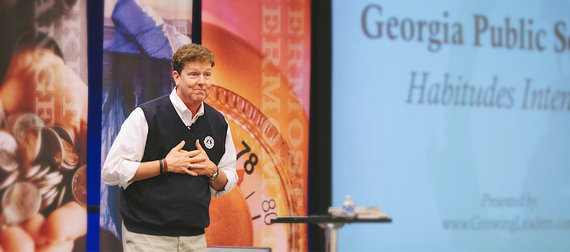No one said raising kids was easy, but in this ever confusing, ever changing world, it's hard to know when to throw our kids a life raft and when to let them swim to shore on their own. Should we drive older kids to school or let them walk? Involve them in activities so there's little down time to get into trouble? Do their science project for them or let them bumble through on their own?
According to educator Dr. Tim Elmore, author of Habitudes for the Journey and president of Growing Leaders (http://growingleaders.com), we do our kids a disservice when we commit three big errors:
- We allow them to risk too little;
- We rescue them too quickly;
- We rave too easily.
Elmore, president of the Atlanta-based non-profit organization created to develop emerging leaders, warns that as a result, this generation of young adults is less risk-adverse and more depressed than any that have come before.
"Rescuing and over-indulging our children is one of the most insidious forms of child abuse," says Elmore. "It's parenting for the short term and misses the point of leadership -- to equip our young people to succeed without help. Instead of rushing to their rescue, laugh together as you share stories of your fumbles in life. Teach your kids that failure is a chance to try again."
Since the 80s, parents have been so determined for every kid to have high self-esteem, they tell them they are "awesome," "smart," and "super," even though they have done very little to earn it.
But no matter how well intentioned, over praising affects the pre-fontal cortex, the reward center of the brain. "The brain center says: 'Don't give up. Don't stop trying,' says Dr. Robert Cloninger at Washington University in St. Louis. "But a person who grows up getting too frequent rewards will not have persistence because they'll quit when the reward disappears. The end result is that kids learn to cheat, exaggerate and lie in order to avoid difficult real life situations."
And while it's a good thing that today's parents are deeply engaged in their children's lives, the bad news is that psychologists are seeing more and more teens with what they call "high arrogance, low self-esteem." Recently, Elmore met with staff members at four major universities who have all encountered multiple students who have never filled out an application on their own. Their parents have always done it for them. Instead of providing well-intended help, their efforts put young adults at a real disadvantage in a grown up world.
A kid who never fails is like one who can't react to the pain of a burn and treat it before infection sets in. The pain of their first failed relationship, a lost ballgame or an 'F' on a test is part of natural health and maturity and helps prepare them for the real world.
Numerous psychologists around the globe, including Sarah Brown of the University of Sheffield in the UK, agree. She reports that kids with overprotective parents have lower test scores and go to college less often than those with parents who allow their kids to take reasonable risks.
So what's a parent to do?
"Obviously, I'm not suggesting that parents condone life threatening risks like drinking or doing drugs," says Elmore. "I am speaking of risks that are thoughtful and valuable. Encourage teens to become involved in something redemptive for their own growth or for the community."
Possibilities include getting a part-time job, volunteering at a soup kitchen, raising money for a cause or organization they believe in or mentoring another kid. These are the kind of risks that promote the healthy neurological development and growth that is necessary to grow into productive adults.
"Above all, don't be a helicopter parent like the mother who called the college president to remind her son to wear a sweater on a chilly day, or the one who texted her son the answers to questions while he was talking to an admissions counselor at Harvard," Elmore says.
But the ultimate helicopter parent may be a Vermont father who built a camera-mounted drone helicopter in order to follow his young son to the nearby school bus stop," says Elmore.
"A kid's social, emotional, spiritual and intellectual muscles can shrink if they are not exercised, says Elmore. "Vaccines expose us to a dose of the disease so our bodies learn to overcome it; exercising strengthens weakened muscles after an injury. Kids must be inoculated with a dose of hardship, delay, challenges and inconvenience to build up the strength to withstand them. Only then do they develop immunity."

